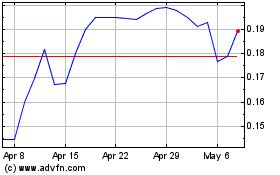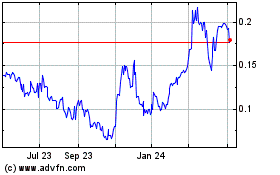Induction of Systemic Immunity Following Treatment of Tumors with PV-10 Reported by Moffitt Cancer Center Researchers at Amer...
April 07 2014 - 6:00AM
Business Wire
PV-10 Treatment Decreases Melanoma Cells in
Tumors and Boosts T-Cells within 7-14 Days
Provectus Biopharmaceuticals, Inc. (OTCQB:PVCT)
(http://www.pvct.com), a development-stage oncology and dermatology
biopharmaceutical company, announced today that a poster
presentation detailing significant decrease in melanoma cells in
patients’ injected tumors 7-14 days after intralesional PV-10
treatment that was accompanied by similar decrease in uninjected
bystander tumors was presented April 6 by researchers from the
Moffitt Cancer Center at the American Association for Cancer
Research Annual Meeting in San Diego, CA. These clinical and
pathologic changes were accompanied by increases in important
immune cell populations detected in the patients’ peripheral
blood.
The poster presentation, based upon abstract #630, entitled
"Induction of anti-melanoma immunity after intralesional ablative
therapy," was authored by Hao Liu, Krithika Kodumudi, Amy Weber,
Amod A. Sarnaik and Shari Pilon-Thomas of the Moffitt Cancer
Center.
Provectus’ investigational drug PV-10, a 10% solution of Rose
Bengal, is currently being studied as a novel cancer therapeutic,
and Provectus has applied to the FDA for breakthrough therapy
designation of PV-10 for the treatment of melanoma based on a 7
center international single-arm trial. PV-10 is designed to
selectively target and destroy cancer cells without harming
surrounding healthy tissue, significantly reducing potential for
systemic side effects. In melanoma patients, intralesional (IL)
injection of PV-10 has led to regression of injected lesions as
well as uninjected metastases. The mechanism of regression of
uninjected lesions is under investigation at Moffitt Cancer Center
(NCT01760499). Further information can be accessed at the following
NIH Registry link:
http://www.clinicaltrials.gov/ct2/show/NCT01760499?term=provectus&rank=10
The Moffitt researchers presented clinical data on 8 melanoma
patients that demonstrated significant decreases in melanoma cells
in injected tumors and uninjected bystander tumors 7-14 days after
PV-10 injection as evidenced by pathologic evaluation confirmed
with immunohistochemical staining of biopsy specimens for melA (a
marker of melanoma). The researchers showed that these changes in
tumors were accompanied by increased populations of CD3+, CD4+ and
CD8+ T cells along with NKT cells in peripheral blood. T cells from
one patient were purified and exhibited increased interferon-gamma
expression when exposed to the patient's pre-treatment melanoma
cells.
In addition, Moffitt’s team found that PV-10 was cytotoxic to
B16 mouse melanoma cells with minimal cytotoxicity to normal skin
cells (fibroblasts). This cytotoxicity occurred via necrosis with
minimal evidence of apoptosis. The PV-10 treatment of B16 tumors in
mice led to release of HMGB1, a soluble Damage Associated Molecule
Pattern (DAMP) that is important in activation of dendritic cells;
such dendritic cells from these mice were selectively active
against B16 tumor cells. PV-10 treatment of B16 tumors in mice also
led to infiltration of dendritic cells into the lymph nodes
draining the treated tumors; no infiltration was observed in
non-draining nodes.
Dr. Pilon-Thomas of Moffitt stated, “These data are exciting and
illustrate successful translation of our pre-clinical work in mice
to clinical results in melanoma patients. With only 8 patients
we've been able to clearly observe statistically significant
increases in beneficial T cell populations in peripheral blood.
Ironically, the original aim of the trial to assess
tumor-infiltrating lymphocytes was thwarted when biopsies of
patient tumors collected just 7-14 days after PV-10 injection no
longer contained viable tumor tissue. We are following up both the
human data and continuing to design more experiments in mice to
better explain the systemic immune effects elicited by PV-10
ablation.”
Dr. Craig Dees, PhD, CEO of Provectus said, "Provectus is
thrilled to collaborate with the immunology and translational
medicine experts Moffitt. As more data become available on the
‘bystander effect’ we’ve consistently observed in our therapeutic
trials, we can better position PV-10 to help the most patients. We
are grateful to the team conducting the work upon which the poster
was based, and believe that their findings further establish the
potential PV-10 has as a powerful tool in the physician’s toolbox
to fight cancer.”
Abstract #630 can be accessed at the following link:
http://www.abstractsonline.com/Plan/ViewAbstract.aspx?mID=3404&sKey=9a90b661-024e-4702-894a-d3f419f9925e&cKey=3ee0b61c-784a-4e56-8ec7-c9b3d868a8b6&mKey=6ffe1446-a164-476a-92e7-c26446874d93
About the American Association for Cancer Research
The AACR is the oldest and largest scientific organization in
the world focused on every aspect of high-quality, innovative
cancer research. Its reputation for scientific breadth and
excellence attract the premier researchers in the field. The
programs and services of the AACR foster the exchange of knowledge
and new ideas among scientists dedicated to cancer research,
provide training opportunities for the next generation of cancer
researchers, and increase public understanding of cancer.
About Moffitt Cancer Center
Located in Tampa, Moffitt is one of only 41 National Cancer
Institute-designated Comprehensive Cancer Centers, a
distinction that recognizes Moffitt’s excellence in research,
its contributions to clinical trials, prevention and cancer
control. Moffitt is the No. 1 cancer hospital in Florida and has
been listed in U.S. News & World Report as one of “America’s
Best Hospitals” for cancer since 1999. With more than 4,200
employees, Moffitt has an economic impact on the state of nearly $2
billion. For more information, visit MOFFITT.org, and follow
the Moffitt momentum
on Facebook, Twitter and YouTube.
About Provectus Biopharmaceuticals, Inc.
Provectus Biopharmaceuticals specializes in developing oncology
and dermatology therapies. Its novel oncology drug PV-10 is
designed to selectively target and destroy cancer cells without
harming surrounding healthy tissue, significantly reducing
potential for systemic side effects. Its oncology focus is on
melanoma, breast cancer and cancers of the liver. The Company has
received orphan drug designations from the FDA for its melanoma and
hepatocellular carcinoma indications. Its dermatological drug PH-10
also targets abnormal or diseased cells, with the current focus on
psoriasis and atopic dermatitis. Provectus has recently completed
Phase 2 trials of PV-10 as a therapy for metastatic melanoma, and
of PH-10 as a topical treatment for atopic dermatitis and
psoriasis. Information about these and the Company's other clinical
trials can be found at the NIH registry, www.clinicaltrials.gov.
For additional information about Provectus please visit the
Company's website at www.pvct.com or contact Porter, LeVay &
Rose, Inc.
FORWARD-LOOKING STATEMENTS: The forward-looking statements
contained herein are subject to certain risks and uncertainties
that could cause actual results to differ materially from those
reflected in the forward-looking statements. Readers are cautioned
not to place undue reliance on these forward-looking statements,
which reflect management's analysis only as of the date hereof. The
company undertakes no obligation to publicly revise these
forward-looking statements to reflect events or circumstances that
arise after the date thereof.
Provectus Biopharmaceuticals, Inc.Peter R. Culpepper,
866-594-5999 #30CFO, COOorPorter, LeVay & Rose, Inc.Marlon
Nurse, 212-564-4700DM, SVP – Investor RelationsorBill Gordon,
212-724-6312Media Relations
Provectus Biopharmaceuti... (QB) (USOTC:PVCT)
Historical Stock Chart
From Mar 2024 to Apr 2024

Provectus Biopharmaceuti... (QB) (USOTC:PVCT)
Historical Stock Chart
From Apr 2023 to Apr 2024
